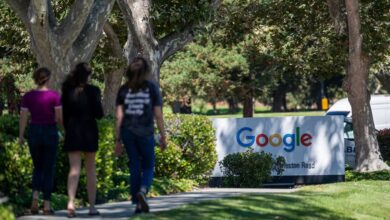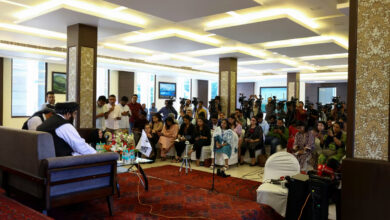“Men and women are two wings of the same bird, which is society. They should empower and support each other for the bird to flight high. Empowering women will also empower society.”
The metaphor of Dalia Ziada, founding director of the American Islamic Congress’ North Africa bureau based in Cairo, human rights activist and blogger, exemplified the message of the first “Freedom to Create” forum, hosted by the American University in Cairo on Wednesday 24 November.
The panel discussion aimed to be an inspiration of intellectual thought as well as ground experience focusing on the “opportunities and challenges of women in creativity and the development of a strong foundation for a more prosperous future,” presenting the examples of six female role models, successful entrepreneurs, and academic supporters for women rights.
Participating were Jehan Sadat, Egypt’s former first lady and founder of the Arab-African Women’s League in support of women and peace, as special guest and opening speaker, Femi Oke, British television presenter and journalist and the moderator of the forum, Dianne Laurance, Australian female entrepreneur and philanthropist, Kimberlé Crenshaw, professor at UCLA School of Law and Columbia Law School specializing in race and gender issues and constitutional law, Mariane Pearl, reporter and co-funder of the Daniel Pearl Foundation, in memory of her husband, the Wall Street Journal journalist, who was kidnapped and murdered by terrorists in Pakistan in 2002, and the Egyptian blogger Dalia Ziada.
After a short introduction by Priti Devi, the spokesperson for the Freedom to Create organization, Sadat remembered her privileged childhood in a multicultural environment growing up with an English mother and Egyptian father, with remarkable opportunities to create and express herself.
“To be creative and empowered, a woman needs space and identity of her own. She needs to feel secure and free to express her ideas, desires and fears. Everyone needs his freedom and economic security,” the former first lady stated.
However, this is not the reality for many women in the Middle East. “No matter how creative many women are,” Mrs. Sadat went on, “many of them can’t express themselves. […] It’s time to embrace each other as brother and sisters, not as enemies; it’s time for creativity and not destruction.”
The dialogue continued with Dianne Laurance, who presented her activities empowering women in Australia. “About ten years ago, I discovered my love for aboriginal art and then in delving deeper all the hardships and suppression of these wonderful female artist,” she said. "My journey now is to help not only bringing their art which depicts their history to the world but to empower these women of the outback of Australia. These women now bring much-needed prosperity to their families and communities through gained strength and financial independence that will be passed on to future female generations. Art heals and lays the foundations for change.”
Dalia Ziada, who felt to be destined to become a woman rights activist at an early age, represented a new generation of youth who fight against injustice and support female empowerment through the use of new technologies and social networking. The blogger and first organizer of Cairo’s first human rights film festival, spoke about the brutality of female genital mutilation (FGM), a traumatic event she underwent at the age of 8, which is still largely practiced in Egypt.
“91% of women in Egypt had FGM. I decided to prevent this from happening again in my family,” Ziada said. “Ten years after my operation, I prevented it from happening to my cousin.” From that moment, Ziada decided she would support the freedom of speech, human rights, and female empowerment.
Pearl discussed the role that media can have in empowering women. As the journalist underlined, this issue is very complex, but media can undoubtedly help "because they can connect people in different parts of the world.”
“The difference between the past generation and the current one is the way women fight for their rights; now we use social media,” Ziada added. But while the use of technology has become essential in the process of self-expression and creativity, what is still ultimately indispensible remains education.
“If we can receive equal education, all the other barriers will fall down,” said Crenshaw. The basis for female empowerment and equal participation of women in society is education and employment, two important elements that in many societies still face the opposition of religious, cultural, and social dogmas, Crenshaw said.
The main outcome of the forum was the necessity to find effective solutions to educate women because “education for women is not a privilege but a right,” according to Laurance.
However, while the participants agreed on the importance of providing primary as well as secondary education to all women, a misleading concept about sexual harassment underlined how the substance of education is still troublesome.
When Egypt’s former first lady was asked how to defeat the plague of sexual harassment, empowering them by ensuring their safety and freedom, the she suggested that “women secure themselves” by not walking at midnight alone with scanty clothes, and avoiding dangerous places.
As the blogger Ziada suggested, this would clash with the concept of freedom and female empowerment. As many studies have underlined, sexual harassment is not related to clothing–since many veiled women face cases of street and sexual harassment daily–but rather to a lack of education since early ages. Men as well as women should be taught to look at women “as human beings and not as sexual objects–with the active engagement of men.”
Freedom to Create organization aims to “build prosperity for tomorrow’s world,” according to Devi. It was founded in 2006, “to harness the power of arts and culture to build more creative and prosperous societies.” According to its spokesperson, “the organization is the cornerstone of a just and fair society. It supports selected programs around the world, supporting meritocracy and creativity to the benefit of human rights.”
Besides the panel, Cairo also hosted the Freedom to Create prize at Salah al-Din Citadel, and a Freedom to Create exhibition at the Opera House which will run until 11 December and features works by highly commended participants in the Freedom to Create Prize competition.




